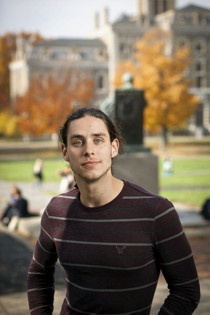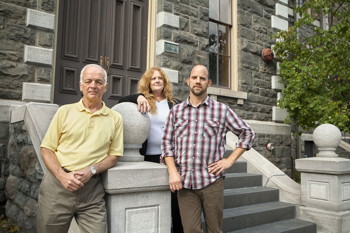COVER STORY
Action Teens, apples and the spirit of democracy: Cornell's culture of public engagement expands the definition of 'land grant'
Page 7 of 9

Shane Kalb '14 earned 40 credits through the CPEP program and then successfully transferred to Cornell this past fall. See larger image
"This is unbelievably exciting, interesting teaching," says Polenberg, who taught at Cornell for 45 years before retiring as the Marie Underhill Noll Professor of History in 2011, of his first semester teaching prisoners.
"These men are quite extraordinary. I don't know what it is they've done, and I'm not really interested … they are very, very well behaved in the classroom and considerate and thoughtful, and they ask really good questions," says Polenberg, whose teaching excellence earned him a Weiss Presidential Fellowship in 2003.
The course is one of 17 offered this semester, for credit, by the Cornell Prison Education Program (CPEP), which has taught 425 incarcerated men since 2001. (No courses are offered to women because there are no women's prisons nearby.) The program is the culmination of work begun in 1995 by English professor Pete Weatherbee, who, without funding, began teaching in the Auburn prison. Since then, 38 other Cornell professors have taught in the program, with another 30 or so participating as guest speakers. Annual funding of $180,000 comes from the Sunshine Lady Foundation founded by Doris Buffett, sister of investor and philanthropist Warren Buffett.
Last June, the program graduated its first class of 15 men, who earned Cayuga Community College associates' degrees. "You have created a learning community within these walls, and your example holds encouragement for others," Seeber told the prisoners at the ceremony.

From left, Cornell Prison Education Program faculty director (and plant biology professor) Robert Turgeon, administrative coordinator Marge Wolff and executive director Jim Schechter. See larger image
CPEP executive director Jim Schechter believes that prison education "addresses a problem on which social progressives and social conservatives find common ground: the unnecessary burden on taxpayers caused by the 67 percent recidivism rate among released prisoners. The system isn't working for the public good," he says, "and emerging research shows that education programs like ours reduce that recidivism rate by 20 to 60 percent, so it's a really cost-effective intervention."
Among the new students arriving on Cornell's campus this fall was transfer student Shane Kalb '14, who earned 40 credits through CPEP while incarcerated at Auburn. In August, with good grades and persuasive recommendations from Cornell professors who had taught him behind bars, Kalb moved from his prison cell to an apartment in Collegetown. On his first day, he stood on the Arts Quad in awe. "I have to tell you," Kalb says, "this is the most beautiful place I have ever seen in my life."
<<View entire story as one page>>
